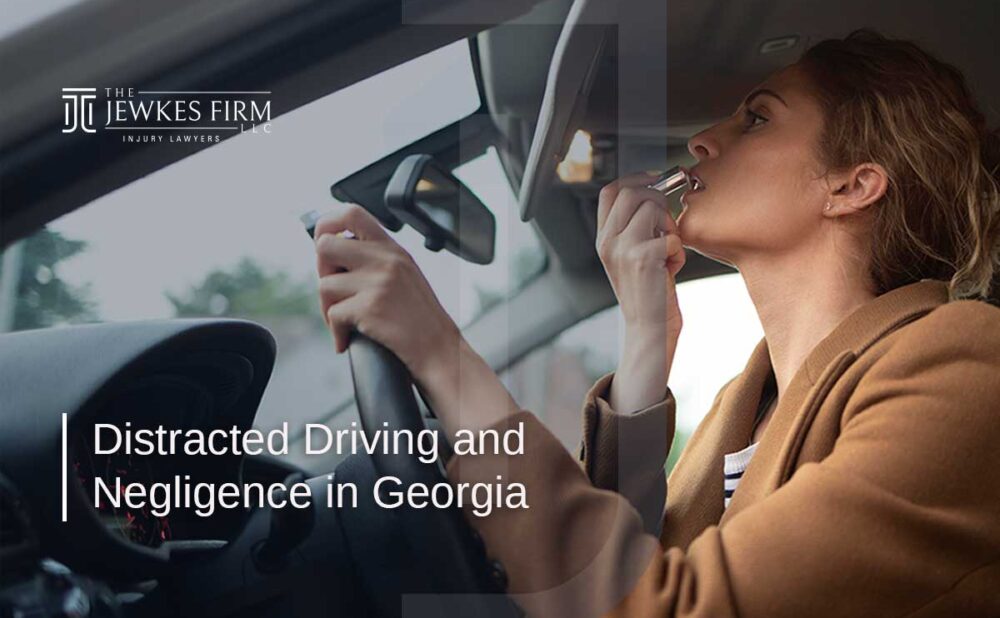Distracted Driving and Negligence in Georgia —What You Need to Know
Distracted driving has emerged as a critical public safety issue, affecting thousands of lives each year. Defined as any activity that diverts attention from driving, distracted driving encompasses a range of behaviors, from texting and talking on the phone to eating or adjusting the radio. With the rise of smartphone use and the increasing prevalence of in-car technology, the dangers associated with distracted driving have become more pronounced, leading to serious accidents and fatalities.
As we delve deeper into the complexities of distracted driving and its implications in Georgia, it is essential to understand the various forms of distractions, the legal framework governing these incidents, and the steps we can take to promote safer driving practices.
At The Jewkes Firm, led by Attorney Jordan Jewkes, we understand how devastating car accidents caused by distracted driving can be. If you or a loved one has been injured due to someone else’s careless behavior behind the wheel, it’s crucial to know your rights and how Georgia law addresses negligence in distracted driving cases.
Distracted Driving and Its Impact
In Georgia, the statistics surrounding distracted driving are alarming. According to the Georgia Governor’s Office of Highway Safety, there were over 23,000 reported crashes attributed to distracted driving in a recent year, resulting in more than 4,000 injuries and numerous fatalities. These numbers underscore the urgent need for awareness and preventive measures to combat this growing epidemic.
Beyond the immediate dangers posed by distracted driving, it also raises significant legal concerns, particularly in personal injury cases. Negligence, a key concept in personal injury law, refers to the failure to exercise reasonable care, resulting in harm to another person. In the context of distracted driving, determining negligence involves assessing whether the driver’s actions fell below the expected standard of care on the road, ultimately impacting the rights of victims seeking compensation for their injuries.
Injured In A Car Wreck? Contact Us For A Free Consultation
Injured In A Car Wreck?

What Is Distracted Driving?
Distracted driving is any action that takes focus away from driving including:
- Texting or using a cell phone
- Eating or drinking
- Talking to passengers
- Adjusting the radio or GPS
- Reaching for objects inside the car
In Georgia, distracted driving is a leading cause of accidents, injuries, and fatalities on the road.
Distracted Driving and Negligence in Georgia — A Legal Perspective
Distracted driving remains a significant concern on Georgia’s roadways, contributing to a substantial number of traffic accidents and fatalities. Understanding the legal implications of distracted driving and how to establish negligence in such cases is crucial for both victims and legal professionals.
The Prevalence of Distracted Driving in Georgia
Recent data underscores the severity of distracted driving in Georgia. In 2022, distracted driving caused over half of all traffic accidents in the state. A 2023 observational survey revealed that approximately 19.6% of drivers exhibited some form of distraction, such as talking, texting, or eating, while operating a vehicle.
Georgia’s Hands-Free Law
Georgia’s Hands-Free Law, codified under O.C.G.A. § 40-6-241, prohibits drivers from holding or supporting a wireless communication device while driving. This includes activities like texting, talking, or using apps. Violating this law can lead to fines and points on the driver’s license. More importantly, such violations can serve as evidence of negligence per se in personal injury lawsuits.
Types of Distractions While Driving
Distracted driving is a multifaceted issue that encompasses various types of distractions. Understanding these categories can help drivers recognize potentially hazardous behaviors and mitigate risks while on the road. Here, we explore the three primary types of distractions that can compromise driver attention. visual distractions, manual distractions, and cognitive distractions.
Visual Distractions
Visual distractions draw a driver’s eyes away from the road. Common examples include looking at a mobile phone, reading text messages, or glancing at enticing billboards. In Georgia, where smartphone use is prevalent, visual distractions pose a significant threat to road safety. Studies indicate that taking your eyes off the road for just a few seconds can dramatically increase the risk of a crash. For instance, a driver who sends texts while driving is 23 times more likely to get into an accident than a driver who isn’t distracted. It’s essential for drivers to remain focused on their surroundings to ensure the safety of themselves and others.
Manual Distractions
Manual distractions occur when a driver removes their hands from the steering wheel. This type of distraction can include actions such as eating or drinking, adjusting the radio or GPS, or even reaching for objects inside the vehicle. Each of these activities diverts attention away from the task of driving and increases the likelihood of an accident. According to the National Highway Traffic Safety Administration (NHTSA), many accidents result from drivers who attempt to multitask behind the wheel. In Georgia, where traffic can be heavy and unpredictable, maintaining full control of the vehicle is crucial for safe driving.
Cognitive Distractions
Cognitive distractions involve a driver’s mental focus being diverted from driving. This type of distraction can arise from daydreaming, engaging in conversations with passengers, or even listening to music or podcasts that require significant mental processing. While drivers may believe they can manage these distractions, cognitive engagement can significantly impair reaction times and decision-making abilities. Research shows that cognitive distractions can affect even experienced drivers, leading to delayed responses to sudden changes in traffic conditions.
In summary, understanding the various types of distractions—visual, manual, and cognitive—can empower drivers to make safer choices on the road. By recognizing the potential hazards of these distractions, individuals can take proactive steps to limit their risks and contribute to a safer driving environment in Georgia.

Georgia’s Distracted Driving Laws
In Georgia, the law recognizes distracted driving as a significant threat to public safety. The Georgia General Assembly has enacted several laws aimed at reducing distractions for drivers. While Georgia does not have a state-wide ban on all forms of distracted driving, it does have specific laws targeting certain behaviors:
- Texting While Driving Ban. Georgia prohibits drivers from texting while operating a motor vehicle. Police consider this a primary offense, meaning they can stop a driver specifically for texting.
- Hands-Free Law. Effective July 2018, Georgia law prohibits drivers from holding or using a mobile device while operating a vehicle. Hands-free devices are allowed. Violating this law not only endangers lives but also can result in substantial fines and penalties. The Hands-Free Law is a critical component of Georgia’s legal framework regarding distracted driving, underscoring the state’s commitment to curbing distractions and enhancing road safety.
- School Zones. Georgia imposes stricter restrictions on phone use in school zones.
Beyond this law, drivers may also face charges for reckless driving if their distractions lead to hazardous situations or accidents. Violating these laws can lead to fines and penalties, but they also serve as important evidence of negligence in an accident case.
Establishing Negligence in Distracted Driving Cases
Negligence is a legal term that means someone failed to exercise reasonable care, leading to another person’s injury or damages. To establish negligence, the injured party must demonstrate that the driver failed to exercise reasonable care while operating their vehicle. In distracted driving cases, this typically involves proving that the driver engaged in a distracting activity—such as texting, talking on the phone, or even eating—at the time of the accident. In Georgia, the legal standard for negligence requires showing four elements:
- Duty of Care. The driver must operate their vehicle safely.
- Breach of Duty. The driver breached that duty by being distracted (e.g., texting while driving).
- Causation. The distracted behavior directly caused the accident and resulting injuries.
- Damages. The accident resulted in physical injury, property damage, or other losses.
In Georgia, if the defendant violated a statute like the Hands-Free Law, it can lead to a presumption of negligence, simplifying the plaintiff’s burden of proof
Comparative Fault in Georgia
Georgia follows a modified comparative fault rule. This means the court can reduce your compensation if it finds you partially at fault. However, if your level of fault exceeds 50%, you cannot recover damages. This emphasizes the importance of establishing clear evidence that the distracted driver was primarily responsible for the incident.
Examples of Successful Personal Injury Claims Related to Distracted Driving
There have been numerous cases in Georgia where victims of distracted driving have successfully pursued personal injury claims. For instance, in a case where a driver was texting while driving and collided with another vehicle, the injured party was able to demonstrate that the driver had breached their duty of care by engaging in a distracting behavior. The court ruled in favor of the injured party, awarding compensation for medical expenses, lost wages, and pain and suffering.
Another example involved a scenario where a driver was adjusting their GPS system while driving, leading to a rear-end collision. The victim was able to present evidence, including witness testimonies and traffic camera footage, to show that the driver’s distraction directly caused the accident. The court found the distracted driver liable and granted compensation to the injured party.
These examples illustrate that when drivers engage in distracting activities, they can be held legally accountable for their actions. Victims of distracted driving accidents in Georgia have the right to seek justice and compensation for their injuries, and understanding the legal implications is a crucial step in the process.
In summary, Georgia’s laws regarding distracted driving, combined with the principles of negligence, create a framework that allows victims to seek redress for their injuries. If you or a loved one has been affected by a distracted driving incident, it is essential to consult with a knowledgeable personal injury attorney who can guide you through the legal process and help you secure the compensation you deserve.
Need a Free Consultation? Need a Skilled Attorney?
Free Consultation
Call (770) 771-5130
If you’ve been injured, you need to hire the best legal care to assist you with your claim. Get a FREE consultation today!
Preventive Measures and Awareness — Tips for Avoiding Distractions While Driving
To combat the growing issue of distracted driving, it is crucial for drivers to adopt proactive measures to minimize distractions while behind the wheel. Here are some effective strategies:
- Put Your Phone Away. The simplest way to avoid distractions from mobile devices is to place your phone in a location that is out of reach, such as in your glove compartment or a bag in the backseat. Consider activating “Do Not Disturb” mode to prevent incoming notifications from distracting you.
- Plan Ahead. Before you start driving, ensure that you have mapped out your route, adjusted your GPS settings, and selected your music playlist. This preparation will help reduce the need for adjustments while on the road.
- Avoid Eating and Drinking. Consuming food or beverages can take your focus away from driving. If you must eat, consider pulling over to a safe location first.
- Limit Passengers. Having too many passengers can lead to distractions. If possible, travel alone or limit the number of people in your vehicle, especially when driving in high-traffic areas.
- Stay Focused on the Road. Make a conscious effort to concentrate on driving. Remind yourself of the importance of staying alert and being aware of your surroundings to react promptly to any potential hazards.
Role of Public Awareness Campaigns in Georgia
Public awareness campaigns play a significant role in educating drivers about the dangers of distracted driving. Organizations such as the Georgia Department of Transportation and local advocacy groups frequently launch initiatives aimed at raising awareness about the consequences of distracted driving. These campaigns often utilize social media, billboards, and community events to share statistics, personal stories, and safety tips.
For example, campaigns like “Eyes on the Road” encourage drivers to commit to not using their phones while driving. These efforts aim to change social norms and reinforce the idea that distracted driving is not only unsafe but also socially unacceptable.
The Role of Legal Representation
Navigating the complexities of distracted driving cases requires experienced legal counsel. If you have been the victim of an accident caused by distracted driving, you need an experienced personal injury attorney who will fight to protect your rights and secure fair compensation.
Attorney Jordan Jewkes brings extensive experience and dedication to every case, handling everything from insurance negotiations to court trials if necessary. We will:
- Thoroughly investigate the crash, gathering evidence such as police reports, witness statements, and electronic data from phones or vehicles.
- Determine liability and build a strong negligence case against the distracted driver.
- Help you obtain compensation for medical bills, lost wages, pain and suffering, and other damages.
- Provide compassionate guidance throughout the legal process.

GEORGIA PERSONAL INJURY LAWYER NEAR ME
Safety Matters
Distracted driving remains a significant threat to road safety in Georgia and across the United States. As we have explored, the myriad distractions that drivers face—from their smartphones to conversations with passengers—can lead to catastrophic consequences, not only for those directly involved but also for innocent bystanders. The statistics paint a sobering picture, underscoring the urgent need for awareness and action.
Addressing distracted driving is not just a matter of individual responsibility. It is a collective effort that requires the commitment of drivers, law enforcement, and legal advocates alike. By understanding the types of distractions and their implications, we can take proactive steps to mitigate risks on our roads. Furthermore, the legal framework surrounding negligence in Georgia provides a pathway for accountability. Thus, ensuring that victims of distracted driving have recourse to seek justice and compensation.
At The Jewkes Firm, we advocate for safer driving practices and supporting those affected by negligent behavior on the roads. We encourage drivers to remain vigilant and focused behind the wheel and to prioritize safety for themselves and others. If you or a loved one has been injured due to distracted driving, don’t hesitate to reach out for legal support. Your safety matters, and together, we can work toward a future where our roads are safer for everyone.
Understanding the legal aspects of negligence in such cases is essential for victims seeking justice. Contact us today at (770) 771-5130 for a free consultation. If you or a loved one suffered injuries in a distracted driving accident caused by another driver’s negligence, The Jewkes Firm and Attorney Jordan Jewkes can help protect your rights and pursue appropriate compensation.
Frequently Asked Questions
What is distracted driving under Georgia law?
Distracted driving in Georgia refers to any activity that diverts a driver's attention from the road. This includes texting, talking on the phone, eating, or using in-car technologies. Georgia's Hands-Free Law specifically prohibits drivers from holding or using wireless devices while driving.
How does Georgia handle negligence in distracted driving accidents?
Georgia uses modified comparative negligence. You can recover damages if you are less than 50% at fault, but your compensation may be reduced based on your share of fault. In Georgia, if a driver causes an accident due to distracted driving, courts can consider them negligent. If a driver violated Georgia's Hands-Free Law or engaged in other distracting behaviors, attorneys could use it as evidence of negligence, making it easier for the injured party to win a case.
What damages can I recover in a distracted driving accident case?
You may recover compensation for medical bills, lost wages, pain and suffering, property damage, and more.
Can I sue a driver who was texting and caused an accident?
Yes. Texting while driving is illegal in Georgia and can be strong evidence of negligence in a personal injury lawsuit.
How can The Jewkes Firm help me with my distracted driving case?
Attorney Jordan Jewkes will investigate your accident, build a strong case, negotiate with insurance companies, and represent you in court if needed to secure fair compensation.





